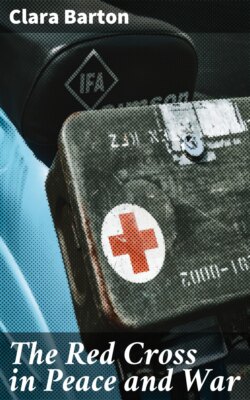Читать книгу The Red Cross in Peace and War - Barton Clara - Страница 18
На сайте Литреса книга снята с продажи.
CONVENTION OF GENEVA.
ОглавлениеFor the Amelioration of the Condition of the Wounded in Armies at the Field, August 22, 1864.
The sovereigns of the following countries, to wit: Baden, Belgium, Denmark, Holland, Spain, Portugal, France, Prussia, Saxony, Würtemberg, and the Federal Council of Switzerland, animated by a common desire of mitigating, as far as in their power, the evils inseparable from war, of suppressing needless severities and of ameliorating the condition of soldiers wounded on fields of battle, having concluded to determine a treaty for this purpose, these plenipotentiaries, after the due interchange of their powers, found to be in good and proper form, have agreed upon the following articles, to wit:
Article 1. Ambulances (field hospitals) and military hospitals shall be acknowledged to be neutral, and as such shall be protected and respected by belligerents, so long as any sick or wounded may be therein. Such neutrality shall cease, if the ambulances or hospitals should be held by a military force.
Art. 2. Persons employed in hospitals and ambulances, comprising the staff for superintendence, medical service, administration, transport of wounded, as well as chaplains, shall participate in the benefit of neutrality whilst so employed, and so long as there remain any to bring in or to succor.
Art. 3. The persons designated in the preceding article may, even after occupation by the enemy, continue to fulfill their duties in the hospital or ambulance which they may have, or may withdraw in order to regain the corps to which they belong. Under such circumstances, when the persons shall cease from their functions, they shall be delivered by the occupying army to the outposts of the enemy. They shall have specially the right of sending a representative to the headquarters of their respective armies.
Art. 4. As the equipment of military hospitals remains subject to the laws of war, persons attached to such hospitals cannot, on withdrawing, carry away any articles but such as are their private property. Under the same circumstances an ambulance shall, on the contrary, retain its equipment.
Art. 5. Inhabitants of the country who may bring help to the wounded shall be respected and shall remain free. The generals of the belligerent powers shall make it their care to inform the inhabitants of the appeal addressed to their humanity, and of the neutrality which will be the consequence of it. Any wounded man entertained and taken care of in a house shall be considered as a protection thereto. Any inhabitant who shall have entertained wounded men in his house shall be exempted from the quartering of troops, as well as from a part of the contributions of war which may be imposed.
Art. 6. Wounded or sick soldiers shall be entertained and taken care of, to whatever nation they may belong. Commanders-in-chief shall have the power to deliver immediately to the outposts of the enemy, soldiers who have been wounded in an engagement, when circumstances permit this to be done, and with the consent of both parties. Those who are recognized after they are healed as incapable of serving, shall be sent back to their country. The others may also be sent back on the condition of not again bearing arms during the continuance of the war. Evacuations, together with the persons under whose directions they take place, shall be protected by an absolute neutrality.
Art. 7. A distinctive and uniform flag shall be adopted for hospitals, ambulances, and evacuations. It must on every occasion be accompanied by the national flag. An arm badge (brassard) shall also be allowed for individuals neutralized, but the delivery thereof shall be left to military authority. The flag and arm badge shall bear a red cross on a white ground.
Art. 8. The details of execution of the present convention shall be regulated by the commanders-in-chief of belligerent armies, according to the instructions of their respective governments, and in conformity with the general principles laid down in this convention.
Art. 9. The high contracting powers have agreed to communicate the present convention to those governments which have not found it convenient to send plenipotentiaries to the International Convention at Geneva, with an invitation to accede thereto; the protocol is, for that purpose, left open.
Art. 10. The present convention shall be ratified and the ratification shall be exchanged at Berne, in four months, or sooner, if possible.
In witness thereof the respective plenipotentiaries have signed the same, and have affixed thereto the seal of their arms.
Done at Geneva, the twenty-third day of August, 1864.
